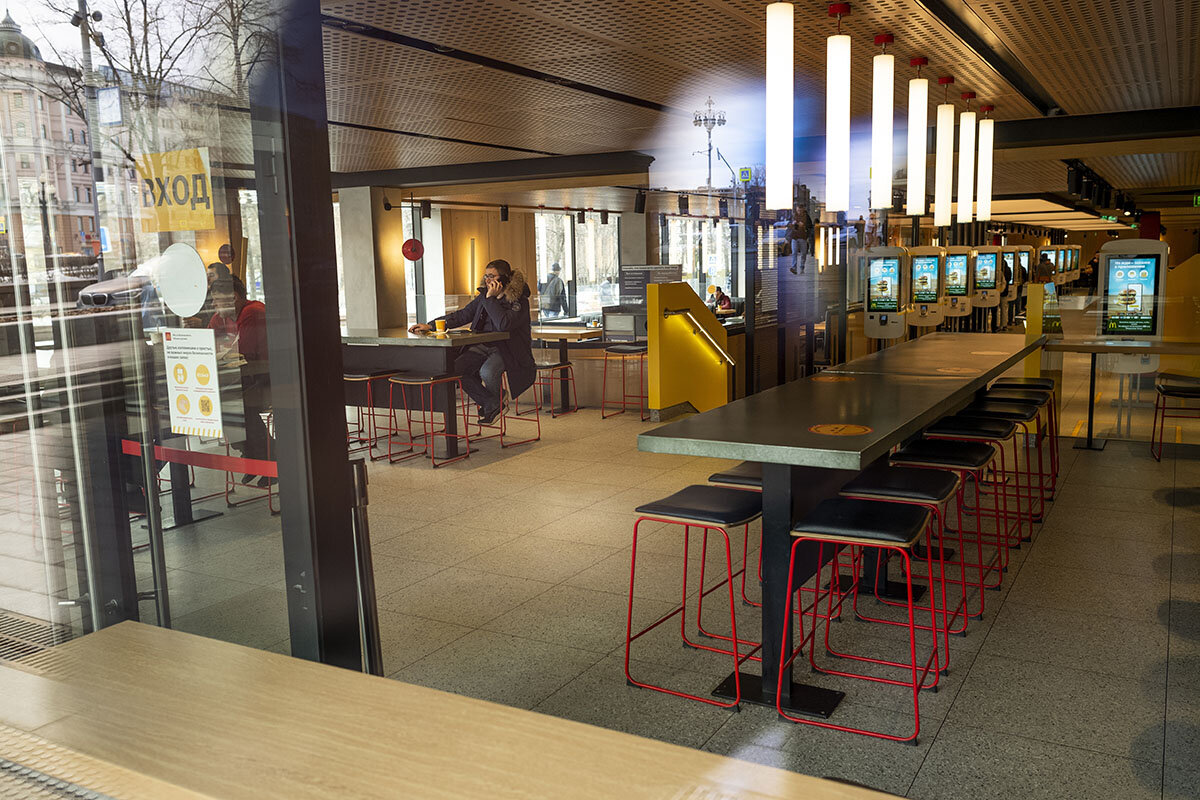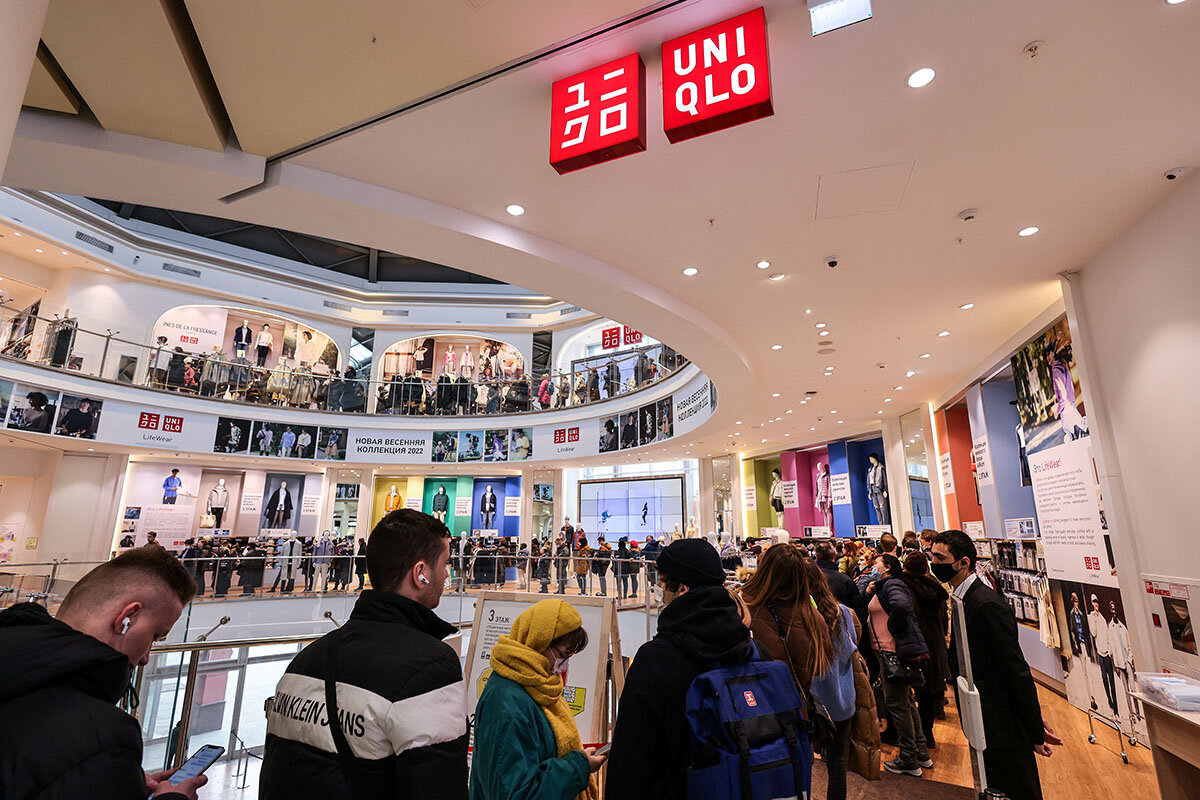‘I see bad times ahead.’ Sanctions start to get real for Russians.
Loading...
| Moscow
Virtually overnight, Russia has become the most sanctioned nation in at least a century, if not ever.
Barely two weeks ago, most Russians enjoyed relatively prosperous, consumerist lives, with access to goods and services familiar to anyone in the West. They were able to travel, use their Russia-based bank cards in just about every country, order services online, and, like billions of the world’s denizens, communicate on universal platforms like Facebook, Instagram, and Twitter.
But Russia‚Äôs so-called special military operation in Ukraine has stirred up a blizzard of economic and financial penalties in response. Amid that storm¬Ý‚Äì which includes the decision of brands like McDonald‚Äôs, Ikea, and Coca-Cola, as well as 300 more, to leave or¬Ý‚Äúpause‚Äù their activities in Russia¬Ý‚Äì and Moscow‚Äôs retaliatory measures, Russians‚Äô place in the interconnected global economy seems about to end, perhaps permanently.
Why We Wrote This
So far, the world’s sweeping economic backlash to Russia’s invasion of Ukraine is primarily being felt by Russians most engaged with the West. But everyone knows that the real bite is yet to come.
The Monitor has talked to more than a dozen Russians to try to gauge their initial experiences, and attitudes, about what looks to be an onrushing long, drawn-out, and life-changing crisis. Several “average” people agreed to speak frankly on condition their surnames not be used. A few well-known analysts spoke on the record, provided no political opinions that might be illegal under be attributed to them.
The emerging picture suggests that everyone is aware that an economic storm is about to hit their lives.
Editor’s note: This article was edited in order to conform with Russian legislation criminalizing references to Russia’s current action in Ukraine as anything other than a “special military operation.”
It’s still early days. A drive around Moscow finds mostly scenes of normality, and little resembling panic.
Grocery stores have well-stocked shelves and only minor price increases so far. Most important, customers are still able to pay with their domestic bank cards¬Ý‚Äì even if they bear the logo of recently departed Visa or Mastercard¬Ý‚Äì thanks to a Russian project begun at the dawn of the sanctions regime eight years ago to develop a self-sufficient Russian payment system, which is now up and running.
There are lines in pharmacies, where supplies of imported medications are being snapped up, but so far no signs of panic-buying of staple foods¬Ý‚Äì even though legal limits on amounts that can be purchased.
It is mostly those with Western connections such as family, business interests, or travel plans who have started to seriously notice the economic woes. For some, it’s that hit hardest.
Nadezhda, a 40-something TV producer, says the plunging ruble, ban on receiving foreign currency, and skyrocketing interest rates (now at an eye-watering 20%) are all sources of concern.
“But right now I am feeling terrible about my daughter, who had to cancel her birthday trip abroad because the skies are suddenly closed,” she says. “She lost her money, but much worse is how it made her feel. ... I suppose we can get along without our favorite fast foods, games, and movies. It’s nothing compared to what those people in Ukraine are going through. But what about the future? Unemployment and social marginalization will lead to more crime. That’s my biggest fear.”
Antonina, a middle-aged homemaker whose husband is Ukrainian, says she isn’t worried about shortages. “If worst comes to worst, we’ll eat beetroot, like we did before,” she says.
But her husband, Yevgeny, a businessperson from Odessa who is a member of Russia’s huge Ukrainian diaspora, says it’s far more complicated than that. “There is no work for me here anymore. I can’t receive payments from abroad. Transportation companies refuse to deliver containers, even if they hold permitted goods. Everyday life is collapsing. With growing repressions, I fear I will be labeled as a foreign agent if I continue working in an international firm. ... So, I have decided to emigrate.”
Some express resentment at being targeted for the perceived wrongs of Russian leaders.
“I hate the expression ‘collective responsibility.’ I never punished a whole class for the misbehavior of one pupil,” says Olga, a retired teacher. “I see bad times ahead. I feel sorry for the youth, who have no experience of the troubles we went through in Soviet times. They already breathed the air of freedom and tasted a new life. Poor kids!”
Closing doors
Ironically, those most immediately impacted appear to be people who have decided to leave Russia, out of dread for the future or opposition to Kremlin policies. Hundreds of journalists, information technology specialists, and other professionals , with many more scrambling to make that decision.
Hello Move is a Netherlands-based emigration service that offers end-to-end assistance for Russians seeking to relocate to Europe, including residency permits, legal advice, logistics help, and assistance in settling in. In the past two years the company aided about 250 Russians, mostly professionals, entrepreneurs, and students, to make that move. In the first few days of the “special military operation” that began on Feb. 24, it received 20,000 inquiries and signed as many new contracts as it usually does in a whole quarter.
The job is much harder now, says company CEO Yury Vilenskiy, because most European embassies and consulates in Russia have closed their doors. Meanwhile, almost all have closed their airspace to Russian planes, and Moscow has retaliated by closing Russian airspace to Western airlines.
“It’s more difficult since the change in the geopolitical situation, but we can still make these arrangements through countries whose doors are still open both ways, like Georgia, Armenia, Turkey, and a few others,” says Mr. Vilenskiy. He seems confident that solutions, or at least workarounds, will be found for most problems.
New currency rules in Russia and the ban on use of international bank cards are certainly an obstacle. “People are going to start using cash, the way they did in the 1990s,” he says. And, indeed, many people are recalling the cataclysmic ’90s, when Russia’s economy collapsed and people were forced to find innovative ways to survive.
One possible avenue of relief may be on the horizon. Russian banks are to issue cards based in Russian ruble accounts but usable in the 180 countries that accept UnionPay.
“Our own payment system is certainly an achievement. It enabled us to avoid panic in the first days,” says Ivan Timofeev, an expert with the Russian International Affairs Council, which is affiliated with the Foreign Ministry. “Currently, all ruble transactions are working well. ... But in the longer run, the condition of Russia’s middle class will depend on resources. Sure, we can have a circulation system, but will people have money to pump into it?”
The government also appears to be attempting to mitigate the effects of the Western multinationals’ withdrawal from Russia by creating a means . Under the proposed law, any business shut down “in the absence of clear economic reasons” can be taken over by the state, which will keep it running, until it is sold as a new company to a domestic owner.
Time running out?
Andrei Kolesnikov, a veteran Moscow-based political analyst, says that so far most people seem to be coping with fast-changing circumstances, but not questioning their political convictions.
“People are going to shops, spending money that’s losing its value on goods that are fast disappearing. But it doesn’t yet affect their attitude to the conflict,” he says.
“I am a member of a small subset of people who could be persecuted politically” as a longtime Kremlin critic. “But I can’t access money. Visa and Mastercard did Putin a huge favor, because now we can’t use our cards abroad. I understand the logic, that we are all responsible for our president. But I am not responsible, nor are so many of my colleagues. Yet we are the first ones paying the price.”










